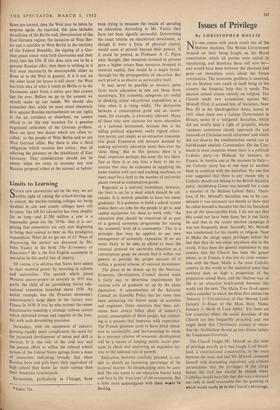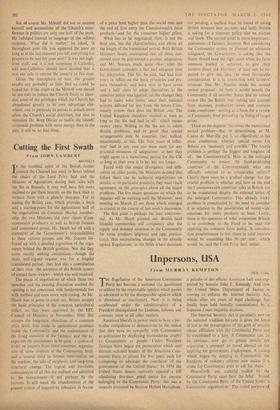Issues of Privilege
By CHRISTOPHER HOLLIS No one comes with much credit out of the Maltese elections. The British Government insisted on their being fought on the Blood constitution which all parties were united in repudiating, and therefore there will now be— and would have been however the elections had gone—an immediate crisis about the future constitution. The economic problem is unsolved, for no Maltese vote could of itself bring to the country the financial help that it needs. The election turned almost entirely on religion. The Church made two accusations against Mr. Mintoff. First, it accused him of Socialism. Now Pius XI in his Quadragesimo Anno, issued in 1931 when there was a Labour Government in Britain, spoke of a 'mitigated' Socialism, which did not totally deny a right of property, whose 'opinions sometimes closely approach the just demands of Christian social reformers' and which did not deserve the condemnation meted out to full-blooded atheistic Communism. On the Con- tinent in most countries where there is a political Catholic party—in Holland, for instance, in France, in Austria and at the moment in Italy— the Catholic party has at one time or another been in coalition with the Socialists. No one has ever suggested that there is any reason why a Catholic should not belong to the British Socialist party. Archbishop Gonzi was himself for a time a member of the Maltese Labour Party. There- fore, if Mr. Mintoff's Socialism was to be con- demned it was necessary not merely to show that he called himself a Socialist but that his Socialism was of the unacceptable kind. I do not say that this could not have been done, but it can fairly be said that in the recent election campaign it was not frequently done. Secondly, Mr. Mintoff was condemned for his insults to religion. Now in Malta the clergy enjoy privileges before the law that they do not enjoy anywhere else in the world. It has been the general experience in this century that the Church has been the gainer where, as in France, it has lost its close connec- tion with the State. Malta is the most Catholic country in the world in the statistical sense that nowhere does so high a proportion of the population attend Mass, and the Maltese way of life is an attractive hotch-potch between this world and the next. The Malta Year Book opens with a calendar in which the three first entries run 'January 1—Circumcision of Our Blessed Lord. January 2—Feast of the Most Holy Name. January 3—Birth of Lord Attlee.' Yet there are few countries where the social doctrines of the Church are less frequently preached, and one might think that Christianity existed to ensure that the Archbishop should go into dinner before the Lieutenant-Governor.
The Church fought.Mr. Mintoff on this issue of privilege exactly as it had fought Lord Strick- land, a constitutional conservative, in the years between the wars, and had Mr. Mintoff contented himself with demanding objectively and without personalities that the privileges of the clergy before the civil law should be abated, many Catholics would have felt that this was a demand not only in itself reasonable but the granting of which would surely be to the Church's advantage. But of course Mr. Mintoff did not so content himself and accusations of the Church's inter- ference in politics are only one half of the truth. He indulged instead in language of the wildest violence. 'What did it matter,' he asked, 'if throughout your life you squeezed the poor so long as at the last moment you left everything for prayers to be said for your soul?' It was not high- level stuff, and it is not surprising if Catholics, and non-Catholics, should have decided that it was not safe to entrust the country to this man.
Given the atmosphere of hate, the present results are probably as little bad as could be hoped for. If the result of the NI intoff vote should be not only to induce the Church freely to aban- don some of the privileges which the Church has abandoned greatly to its own advantage else- where, and to persuade its priests to preach more often the Church's social doctrines, but also to stimulate Dr. Borg Olivier to tackle the islands' economic problem with more energy than in the past, it will be no bad thing.



































 Previous page
Previous page